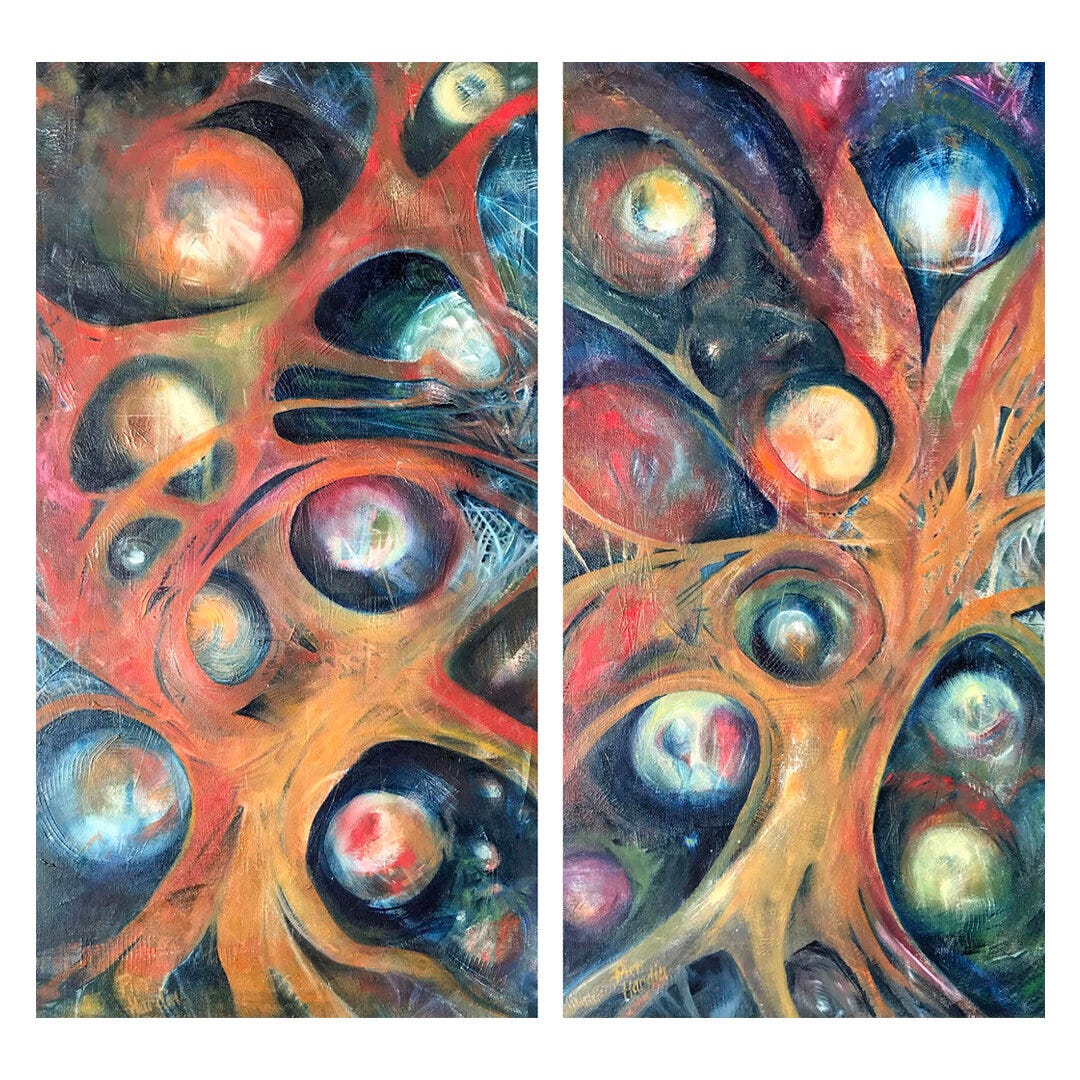Areley Kings
Pier’s art, a medieval poet, and the Stack of the Week
Check out Pier’s work at Pierhardinart.com.
A poem about a medieval poet
Layamon was the first poet (or at least the first whose work is preserved) to write about King Arthur in the English language, in his immensely long and (for modern readers) impenetrable poem, The Brut. It’s difficult to date, because his language is intentionally antiquarian, to the point that the scribes of the two extant manuscripts of the poem don’t really know what to do with him. One of the scribes attempts to “modernize” his language and, as a result, the two manuscripts are radically different from each other. My best guess is that the manuscripts date from the late thirteenth century, and the poem itself was probably written at least fifty years before that.
We do, however, know something about Layamon, even if we don’t know his dates, because he tells us about himself in his poem. We know that he was a priest at a parish church in the village of Areley Kings, which is about ten miles north of Worcester on the River Severn. His church, St. Bartholomew’s, is still there, though much of it was rebuilt in the later Middle Ages. There is a stained-glass representation of Layamon in one of the church windows; I used to have a picture of it, which my father took for me on a trip there many years ago, but I can’t seem to find it.
I wrote about Layamon in the final chapter of my dissertation, way back in the early 2000s, and I became a bit obsessed with him. I wrote this poem around that time. The italicized parts are paraphrases from Layamon’s eccentric variation of early Middle English.
Areley Kings
His church still stands,
though he would not
know it—red stone
steeple. He wrote
of himself:
*
A priest named Layamon came to this land,
Leovenath's son —God have mercy on him!
He lived at Areley, at a noble church
by the Severn's bank —he thought it fine there—
near Redstone; there he read books.
*
Stained glass in the
evening's gloaming
finds him reading,
writing, alone
with Bede, with Wace:
*
Layamon traveled widely across the land,
sought learnéd books to guide his thoughts.
He chose the English book of Saint Bede.
He chose another, this one in Latin
by Saint Albin and the blessed Augustine,
who brought baptism to the English.
He placed a third amongst the others,
by a French cleric named Wace,
who could write well.
Wace had given his own book
to Queen Eleanor (muse of Bernart),
bride of Henry, the high king.
*
Victorian
plaque claims him as
England's eldest
poet. Inscribed
in steel—but wrong:
*
Layamon took a feathered pen
with fingers and wrote on fine pages,
and he joined together words of truth,
and the three books he made into one.
*
Antiquarian
cipher of a
poet—our scribes
can't make heads or tails
of him. We know
of him only
what he tells us,
when he prays from
Areley Kings:
*
Now Layamon bids all virtuous folk,
for the sake of almighty God,
to read this book and learn these writings,
and repeat for others these truthful words
for his father's soul, who brought him forth,
and for his mother's soul, she who bore him,
and for his own soul, so that it will be better for it.
Amen.
The Stack of the Week
For the first time, I’m following a new Substack from its very beginning. My friend and colleague Ellen Wilson launched I Would Prefer Not To this past week, and she has already covered topics ranging from the difficulty of making friends as an adult to the challenges of middle age to the ideal form of fried pickles. Her posts range freely in order to form, as she describes it, a sort of commonplace book in newsletter form.
Ellen is a brilliant librarian, and so her newsletter, named for the memorable, repeated phrase of Melville’s Bartleby, is sort of like an enjoyable stroll in the stacks, taking down a book here, a journal there, and perusing with pleasure.
Get in on the ground floor! Here is a good place to start:
Thanks for reading, from my fancy internet typewriter to yours.






Oh, wow - thank you!
What a wonderful story! I loved reading Bede in graduate school, but Layamon is new to me. I can feel the life-force in those venerable inscriptions of his name and place and profession and paternity. For a priest, he seems not quite to have trusted the ineffable. Oh, the darned fury to write things down!